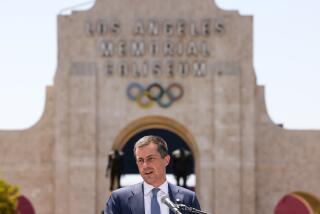Candidates Urged to Move on Mass-Transit Programs : Infrastructure: Panel says first priority is funding bill allowing use of federal highway funds to buy subways, buses.
SAN DIEGO â Buoyed by the growing emergence of the countryâs infrastructure as a presidential campaign issue, a group of transportation officials Monday challenged the candidates to move swiftly in launching an aggressive mass transit program.
Members of the American Public Transit Assn., meeting in San Diego for their annual convention, urged President Bush, Bill Clinton and Ross Perot to use federal investment in transportation-improvement programs to spur the economy and cushion major job losses in defense industries.
Transit officials said their first priority is full funding of a landmark transportation bill adopted last year, which would allow states and cities to use federal highway funds to build subways or buy buses. The officials said they hoped whoever wins will act on a transit bill within 100 days of the inauguration.
Although Bush supported some key features of the bill, such as an innovative ability to shift highway funds to mass-transit projects, his Administration did not fully fund all of its programs. Full funding would have required $5.2 billion this year; about 70% of that, or $3.8 billion, was appropriated.
Clinton, responding in writing to an APTA query on budget priorities, has promised to fully fund the $5-billion-a-year transportation plan--and add perhaps $1 billion a year above the sum authorized by federal policy.
Bush and Perot have yet to respond to the transit association. Clinton aides on Tuesday criticized Bushâs decision last week to designate five new high-speed rail lines as âjust another election-year promise to buy votes.â
California contains one of the rail lines, which were designated as part of the policy bill approved last year. The Bush Administration has made available $1.2 million to study how to eliminate road-rail intersections along a small part of the San Diego-to-Oakland route.
While privately excited by the prospect of a new Administration apparently more favorably disposed to mass transit, APTA officials were careful to keep doors open to all candidates.
âRegardless of who gets elected, we want to make sure we are part of the puzzle during the first 100 days (of the new term),â said Neil Peterson, Los Angeles County Transportation Commission executive director, who serves as chairman of APTAâs Legislative Affairs Committee.
Peterson and other top officials of APTA, which represents most of the public-transit agencies in the United States and Canada, said every $100 million invested in transit creates 6,000 âgood, full-time jobs,â as well as helping the nationâs cities and rural regions deal with congestion and air-pollution problems.
âIt is a fact that investment in public facilities--like mass transit--support the private sector economy, create jobs and at the same time protect the environment and conserve petroleum,â said Louis J. Gambaccini, APTAâs incoming chairman and general manager of the Southeastern Pennsylvania Transit Authority in Philadelphia.
Others at APTA urged that high-profile construction jobs should not come at the expense of federal operating subsidies for big cities. The recession has reduced ridership on most systems, reducing income from fares and putting many in financial difficulty.
More to Read
Sign up for Essential California
The most important California stories and recommendations in your inbox every morning.
You may occasionally receive promotional content from the Los Angeles Times.










